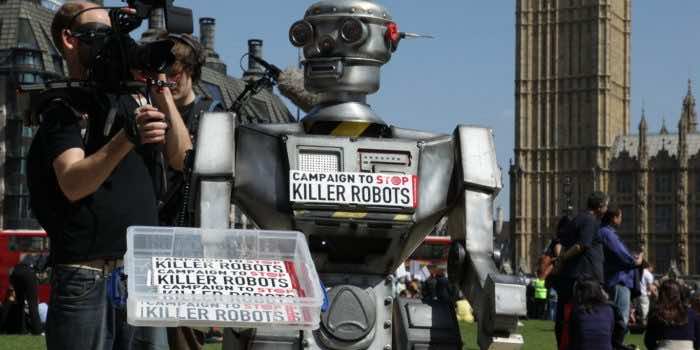Associate Professor Baker’s latest book, Should We Ban Killer Robots? is based on his experience on the International Panel on the Regulation of Autonomous Weapons (IPRAW) from 2017-19. You can buy the book here.
IPRAW is an international network of researchers that provides non-partisan guidance to the national delegations engaged in the UN debate over whether to ban or regulate LAWS.
“This book is my attempt to pull together my views on this topic, which have emerged from my time as an IPRAW panelist and other subsequent policy-focused work on this topic,” A/Prof. Baker says.
He further elaborated that there are two main arguments for banning LAWS. One focuses on the potential consequences of allowing LAWS to be used in war.

“For example, opponents are concerned that LAWS won’t be capable of operating within the boundaries of the law of armed conflict,” A/Prof. Baker said.
“The worry here is that they will use force in an indiscriminate or disproportionate manner.
“The other main type of argument is that consequences aside, it’s simply fundamentally wrong to allow a machine to make the choice to kill a human being.”
A/Prof. Baker believes that the less developed states are more inclined towards a ban, while powerful and technologically advanced states are not very supportive.
“Proponents of LAWS argue that these systems can save lives in a number of ways,” he said.
“For example, there is the claim that robots can be sent to do ‘dull, dangerous, and dirty’ jobs without having to risk a human soldier, sailor, or aviator.
‘The other main type of argument is that consequences aside, it’s simply fundamentally wrong to allow a machine to make the choice to kill a human being.’
“They also argue that LAWS will be less prone to using indiscriminate force because they don’t get scared, angry or confused in the way that human combatants can in the midst of combat.”
“We’re a long way from the terminator situation happening, if indeed it ever does!” A/Prof. Baker assured.

“I think there’s no doubt that we will start to see more and more lethal autonomous weapons participating in wars – the UN believes we have already seen the first humans be killed by autonomous weapons, in the Yemen conflict. But it’s my view that they will be unlikely to play much more than a supplementary role for some time to come.”
He stated highly advanced systems will be very expensive and hence, rare, while simple autonomous systems will be constrained by limited capability.
“Over the longer term we will start to see more sophisticated systems becoming more affordable and therefore more prolific, and the simpler systems will themselves become more capable,” A/Prof. Baker said.
“Even if they don’t agree with my conclusion, hopefully, their thinking will have been challenged and their views sharpened in the process.”
Source: University Of New South Wales


